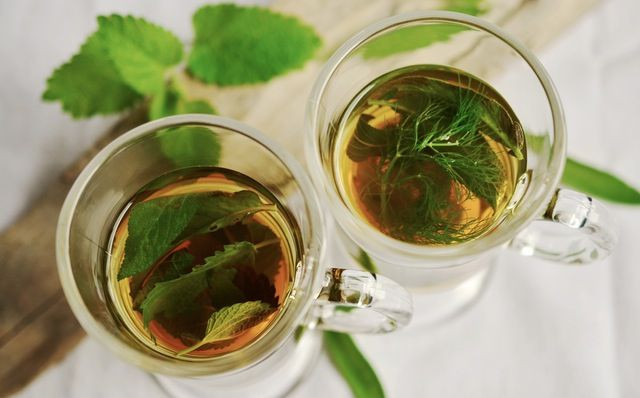Nettle Tea And 5 Other Types Of Healing Herbal Teas You Didn't Know Were Good For You

A warming, tasty cup of herbal tea is the ideal caffeine-free brew to energize and to soothe. Herbal teas have been regarded as a key to good health, happiness, and even knowledge, and provide powerful antioxidants that deliver a health punch. So, which herbal teas should you pick out for stress, weight loss, or the flu?
Herbal teas are made from different parts of a plant, including flowers, roots, seeds, or bark, which will affect each tea's role in healing ailments. Researchers have found some teas help with cancer and heart disease, while others encourage weight loss and promote good sleep. Although science hasn't figured out how long tea needs to be steeped, or how much you need to drink, brewed teas are believed to deliver the most benefits without the extra calories from sweeteners.
Sit back, and discover the six herbal teas you didn't know could heal your health.
Rooibos Tea
Helps with headaches and skin conditions
This tea is known for its vibrant red color, and its many benefits for the body. Rooibos contains magnesium, which is thought to affect changes in blood vessels in the brain and increase blood flow. Rooibos tea is rich in many minerals such as iron, calcium, potassium, copper, manganese, zinc, magnesium, and alpha hydroxy acid.
Some studies suggest 200 to 600 milligrams (mg) of magnesium per day may reduce how often people get migraines. Moreover, when given intravenously, magnesium is “possibly effective” for treatment of migraines, according to the National Institutes of Health.
Rooibos tea can also be added to your skincare routine due to its alpha hydroxy acid and zinc. Alpha hydroxy acids, such as glycolic acid and lactic acid, have been used for ages for skin rejuvenation. It can alleviate acne, pimples, uneven skin tone, and fine lines.
Lemon Balm Tea
Helps with anxiety, stress relief, and insomnia
A brew of lemon balm tea is distinct because of its mild lemony aroma. This tea combined with other calming herbs, such as valerian, hops, and chamomile, help reduce anxiety and promote good sleep. For example, in one study of people with sleep problems, 81 percent who took an herbal combination of valerian and lemon balm slept much better than those who took a placebo.
When it comes to stress and anxiety, lemongrass can help reduce symptoms. In one study, researchers gave low doses of a lemon balm extract to mice. There was a decrease in anxiety-related behaviors when the animals were placed in an unfamiliar environment. Higher doses of lemon balm extract led to pain-relieving effects. These results were found in lab animals and have not been yet been tested for people.
Nettle Tea
Helps with urinary tract infections (UTI) and allergies
This natural diuretic has been used for centuries for its healing and nutritional properties. As a diuretic, it can help flush out harmful bacteria from the body. A study in the Journal of Dietary Supplements found nettle tea can flush out toxins from the urinary tract, while aiding medications used to treat UTI.
Nettle also has anti-inflammatory benefits that can aid in the treatment of allergies. Symptoms of itchy, watery eyes, sneezing, and runny nose are found to be alleviated with nettle. One study found nettle capsules helped reduce sneezing and itching in people with hay fever.
Thyme Tea
Helps coughs and brain cells
Thyme is a great herbal remedy rich in minerals, flavonoids, and antioxidants. Thymol, an oil in thyme, can increase the omega-3 fatty acids essential for growth of brain cells. One study found thyme oil can help to protect brain cells against aging and may help protect against Alzheimer’s disease.
Thyme tea has also been found to relax coughs and bronchitis and fight against infections. In one study, a combination of thyme and ivy leaves helped to alleviate coughing and other symptoms of acute bronchitis.
Pu-erh Tea
Helps boost heart health
Pu-erh is made from fermented and aged leaves, and is considered the most oxidized form of tea. Studies have shown the microbial aging of pu-erh tea can lead to the production of small amounts of lovastatin, a natural statin. In the synthetic form, lovastin is commonly used to treat high cholesterol.
Elderflower Tea
Helps with the flu
Elderflowers are noted for their use in traditional German medicine for their antioxidant and antiviral effects. Elderflower may help treat the flu. In one study, when participants were treated with elder extract, 90 percent were cured within two to three days compared to six days in the placebo group. It can even make you sweat more while treating a cold or the flu.



























